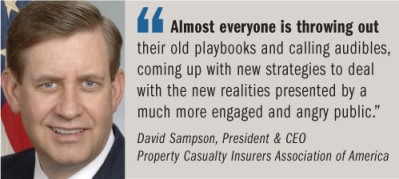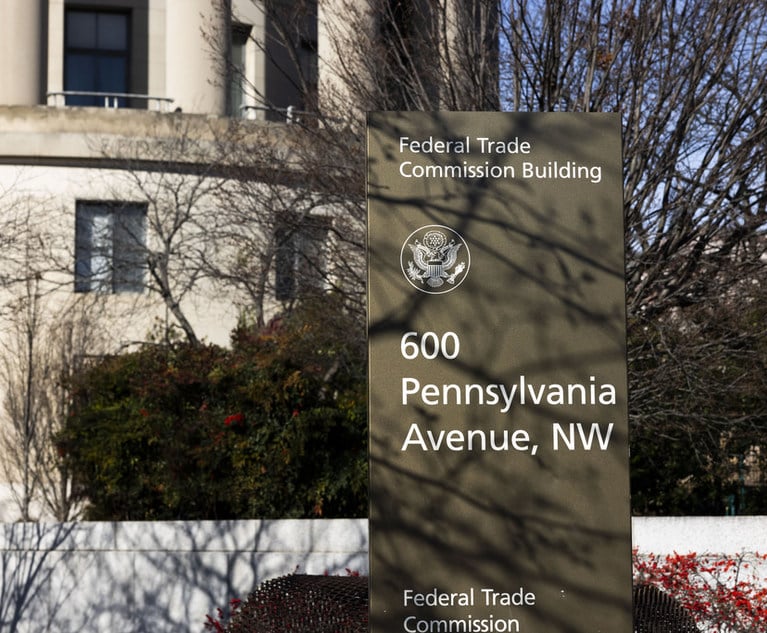San Antonio
|Property and casualty insurers could easily be trapped in the"wave of political populism" sweeping the country in the wake ofthe nation's economic and leadership crises, an insurer associationleader warned.
|"Many may believe that because people are so focused on bashingthe bankers and Wall Street that the public and politicians willleave insurers alone, but I am not so sanguine," said DavidSampson, president and chief executive officer of the PropertyCasualty Insurers Association of America.
| "Once you start a prairie fire, it's hard to control," headded, speaking here last week at PCI's Executive RoundtableSeminar.
"Once you start a prairie fire, it's hard to control," headded, speaking here last week at PCI's Executive RoundtableSeminar.
"The first order of business will be attacks on healthinsurers," following the inability thus far of Democrats inCongress to get a health care reform bill to President BarackObama's desk, he said. "But it's a very short leap to the rest ofour industry. Our research has confirmed that most people don'tmake a distinction among the various sectors of the insuranceindustry."
|At first, he said, "we were concerned about being swept into thefinancial services regulatory overhaul legislation still beingshaped in Congress. Thus far, we've been well-positioned to staveoff any collateral damage to the p&c industry, but the processis far from over, especially now that it is becoming the onlypriority legislative item still on the table."
|Public anger at the financial sector could result in a broaderattack against the insurance industry, according to Mr. Sampson,noting that nothing was off limits, including auto and homeownersinsurance pricing, the use of credit scoring in underwriting, tortreforms, federal antitrust protection under the McCarran-FergusonAct, as well as flood insurance.
|"Short-term extension of the National Flood Insurance Program isnot ideal, but we could be extremely vulnerable if they ever doopen this up for debate," he said. "The fundamental structure ofthe NFIP could change if calls for reform are taken to theirextreme." Some would like to expand the flood program to coverwind-related risks, for example, he noted.
|Mr. Sampson said that the growing political populism in thiscountry is being driven by economic uncertainty and leadershipinstability.
|He cited various polls showing that the majority feel thecountry is on the wrong track, that Congress is doing a poor jobcoping with the country's economic woes, and that President Obama'sapproval ratings have fallen below 50 percent.
|One tangible result of growing public dissatisfaction was theelection last month of a Republican dark horse, Scott Brown, to theU.S. Senate, giving the GOP a crucial 41st vote to block Democraticlegislative initiatives such as health care reform and tax hikes,according to Mr. Sampson.
|He said Mr. Brown's election was "nothing less than a tectonicshift in the political ground beneath our feet, and we'll befeeling the aftershocks for quite some time"–certainly into thecrucial midterm elections this November.
|At the start of his speech, Mr. Sampson noted that he hadpredicted last year at this time that "voters would turn on theWhite House and Congress" if the public's "high expectations werenot met."
|He said dissatisfaction with soaring deficits and "overreaching"by government into the private sector had turned independentvoters–who he called "the fulcrum of the Americanelectorate"–against the Democrats in Washington and in their homestates.
|Such repercussions are likely to continue to have an effect thisNovember, he predicted, especially given the likelihood thatunemployment will remain in the double-digits come ElectionDay.
|"People are looking for authentic leadership–not just inpolitics, but in the business community as well, among consumersand investors," according to Mr. Sampson. "People are looking tosee if rhetoric matches reality and hold them accountable for doingwhat they said they would do."
|As a result, he said, "almost everyone is throwing out their oldplaybooks and calling audibles, coming up with new strategies todeal with the new realities presented by a much more engaged andangry public."
|Earlier at the conference, Joan Lamm-Tennant, global chiefeconomist and risk strategist for Guy Carpenter & Company, toldthe PCI executives gathered here that the p&c industry has "agreat opportunity today because we've come through the financialcrisis much better than our counterparts in other sectors of thefinancial services industry."
|She urged the p&c industry to launch "a full-court press tomake everyone aware of this fact, to help us restore ourcredibility in terms of handling risk."
Want to continue reading?
Become a Free PropertyCasualty360 Digital Reader
Your access to unlimited PropertyCasualty360 content isn’t changing.
Once you are an ALM digital member, you’ll receive:
- All PropertyCasualty360.com news coverage, best practices, and in-depth analysis.
- Educational webcasts, resources from industry leaders, and informative newsletters.
- Other award-winning websites including BenefitsPRO.com and ThinkAdvisor.com.
Already have an account? Sign In
© 2024 ALM Global, LLC, All Rights Reserved. Request academic re-use from www.copyright.com. All other uses, submit a request to [email protected]. For more information visit Asset & Logo Licensing.








